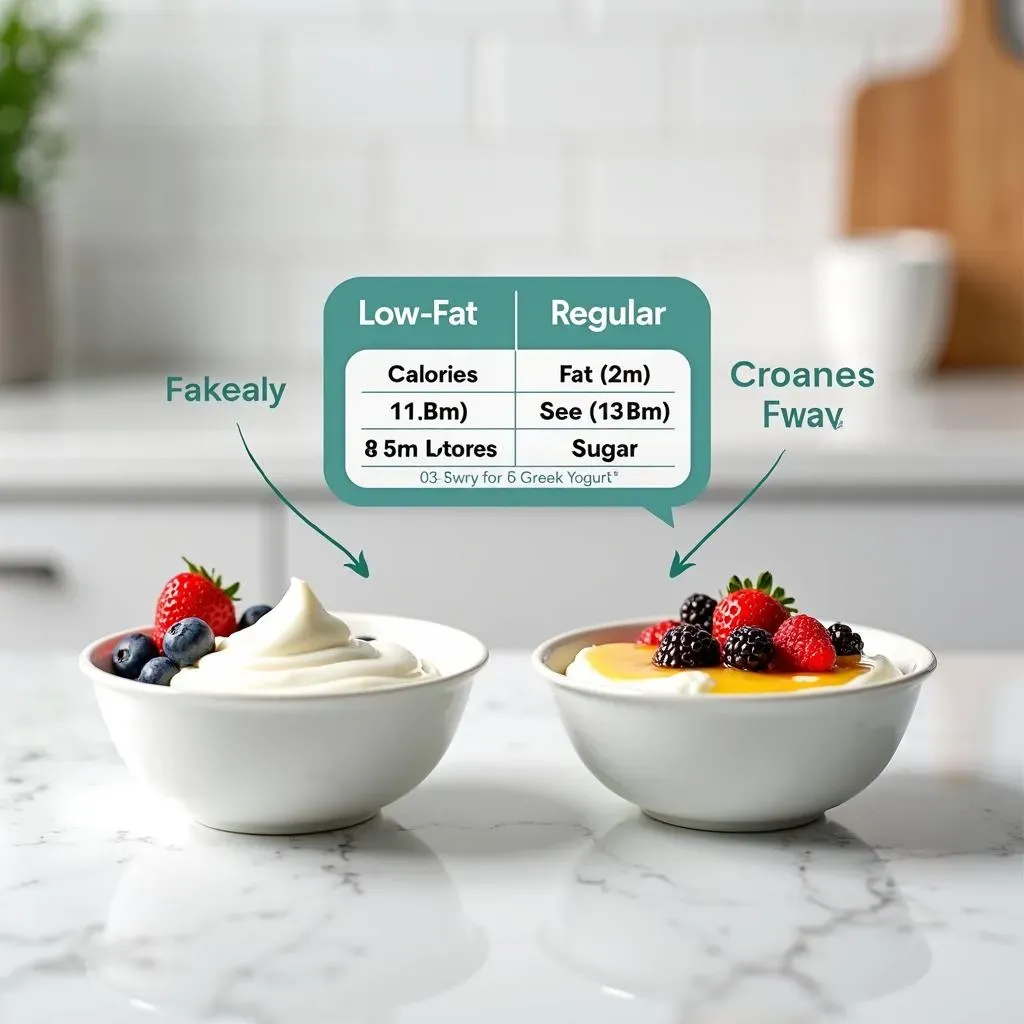Table of Contents
Walk down any grocery store aisle, and you're bombarded with "healthy" choices. Among them, Greek yogurt stands out, often hailed as a protein powerhouse. But with options ranging from full-fat to non-fat, it begs the question: is low fat Greek yogurt better for you? The answer, like most things in nutrition, isn't a simple yes or no. It's a nuanced exploration of fat content, added sugars, protein levels, and your individual dietary needs. This article dives deep into the world of Greek yogurt, comparing low-fat and regular varieties. We'll dissect the nutritional profiles, weigh the benefits for weight loss, and uncover any hidden additives lurking in those seemingly innocent containers. By the end, you'll be armed with the knowledge to confidently choose the Greek yogurt that truly supports your health goals. So, let’s peel back the layers of the yogurt aisle and discover what's best for you. We'll explore everything from calorie counts to probiotic power, ensuring you make an informed decision that aligns with your wellness journey.
LowFat Greek Yogurt vs. Regular: What's the Real Difference?

LowFat Greek Yogurt vs. Regular: What's the Real Difference?
The Fat Factor: A Quick Breakdown
so first things first: let's talk fat. Regular Greek yogurt contains more fat than its low-fat counterpart. That's pretty obvious, right? But the type of fat matters. We're talking mostly saturated fat here, which has gotten a bad rap over the years. Now, dietary fat isn't the enemy it was once made out to be, but moderation is still key. The big difference in Greek yogurt comes down to how much fat is present, and that impacts the calorie count and overall texture.
Think of it this way: full-fat Greek yogurt is richer and creamier because of that fat content. Low-fat versions remove a significant portion of that fat, leading to a slightly different taste and mouthfeel. It's not necessarily a bad thing, just different. It all boils down to personal preference and dietary needs.
Calories, Taste, and Texture
Beyond the fat content, the calorie count is another major difference. Low-fat Greek yogurt naturally has fewer calories per serving compared to regular. This is a significant point for anyone watching their calorie intake or trying to manage their weight. But remember, calories aren't everything! It's the overall nutritional profile that counts.
Also, the texture changes when you remove fat. Low-fat versions can sometimes be a bit thinner or even slightly chalky. Food manufacturers often add thickeners or stabilizers to compensate for the missing fat. This is where label reading becomes crucial. You want to know what you're actually putting into your body.
Nutrient Density: What Are You Really Getting?
Don't be fooled into thinking that low-fat automatically means healthier. While it's true that you're cutting down on fat and calories, you might be sacrificing other nutrients in the process. Both regular and low-fat Greek yogurt are excellent sources of protein, calcium, and probiotics, but the proportions can vary slightly.
For example, some brands might add sugar to low-fat versions to improve the taste and make them more appealing. This added sugar can negate some of the benefits of reducing fat. That’s why it’s important to compare nutrition labels. Look at the protein content, sugar content, and the list of ingredients. Choose the option that aligns best with your health goals.
Nutrient | Full-Fat Greek Yogurt (per serving) | Low-Fat Greek Yogurt (per serving) |
|---|---|---|
Calories | ~150 | ~100 |
Fat | 8g | 2g |
Protein | 20g | 22g |
Sugar | 5g | 7g (may vary) |
Calcium | 20% DV | 20% DV |
Is LowFat Greek Yogurt Better for Weight Loss and Calorie Control?

Is LowFat Greek Yogurt Better for Weight Loss and Calorie Control?
The Calorie Deficit Game
let's get real about weight loss. It all boils down to creating a calorie deficit – burning more calories than you consume. And that's where low-fat Greek yogurt can be a helpful tool. Since it has fewer calories than regular Greek yogurt, you can enjoy a satisfying serving without blowing your calorie budget. Think of it as a strategic advantage in your weight loss journey. You are getting the same satisfaction with less calories, and this will contribute to your weightloss journey.
But here's the catch: simply swapping regular yogurt for low-fat won't magically melt away the pounds. It's about the bigger picture. Are you pairing that yogurt with sugary granola and a drizzle of honey? Then you're likely negating the calorie savings. Instead, focus on building a balanced meal with protein, fiber, and healthy fats. Think berries, a sprinkle of nuts, or a dollop of natural peanut butter. These additions will not only enhance the flavor but also keep you feeling fuller for longer, preventing those mid-morning cravings that can derail your progress.
Protein Power: Your Weight Loss Ally
One of the biggest advantages of Greek yogurt, whether it's low-fat or regular, is its high protein content. Protein is a superstar when it comes to weight management. It helps you feel full and satisfied, reducing the urge to snack on unhealthy foods. It also plays a crucial role in preserving lean muscle mass, which is essential for boosting your metabolism and burning more calories throughout the day.
In some cases, low-fat Greek yogurt may even have a slightly higher protein content than its full-fat counterpart. This is because manufacturers often compensate for the removed fat by adding more protein. So, if you're specifically looking to maximize your protein intake while minimizing calories, low-fat Greek yogurt might be the way to go. Just be sure to check the nutrition label to compare the protein content of different brands and varieties. Every brand is different, so be sure to check the label.
Beware of the Hidden Sugars!
This is where things can get tricky. To make low-fat Greek yogurt more palatable, some brands load it up with added sugars. This is a major red flag, as excessive sugar intake can sabotage your weight loss efforts and lead to other health problems. Always read the ingredient list carefully and choose options with little to no added sugar.
Look for plain, unsweetened varieties and add your own natural sweeteners, such as fresh fruit, a drizzle of honey, or a sprinkle of cinnamon. This way, you have complete control over the sugar content and can customize the flavor to your liking. Remember, you're aiming for a healthy and sustainable eating pattern, not a quick fix that leaves you craving more sugar later on.
Factor | Low-Fat Greek Yogurt | Considerations for Weight Loss |
|---|---|---|
Calories | Lower | Helps create a calorie deficit |
Protein | High (may be higher than full-fat) | Promotes satiety and preserves muscle mass |
Sugar | Varies (check the label!) | Choose options with little to no added sugar |
Overall | Can be a useful tool | Must be part of a balanced diet and exercise plan |
The Nutritional Showdown: Protein, Calcium, and Probiotics in Greek Yogurt

The Nutritional Showdown: Protein, Calcium, and Probiotics in Greek Yogurt
Protein: The Muscle-Building Champion
Let's talk protein, because Greek yogurt is a true champion in this arena! Both low-fat and regular varieties pack a serious protein punch, but the protein content can vary slightly depending on the brand. Protein is essential for building and repairing tissues, supporting a healthy metabolism, and keeping you feeling full and satisfied. It's the building block of our bodies, and Greek yogurt is a convenient and delicious way to get your daily dose. Whether you're hitting the gym hard or simply trying to maintain a healthy lifestyle, protein is your friend, and Greek yogurt is a great source.
When comparing low-fat and regular Greek yogurt, you might notice that the low-fat version sometimes boasts a slightly higher protein content. This is often because manufacturers add extra protein to compensate for the fat that's been removed. So, if you're specifically looking to maximize your protein intake, low-fat Greek yogurt could be the winner. However, always check the nutrition label to compare the protein content of different brands, as it can vary. Every bit of protein you can get in is great!
Calcium and Probiotics: Bonus Benefits
Beyond protein, Greek yogurt is also a good source of calcium, which is crucial for strong bones and teeth. Both low-fat and regular varieties provide a similar amount of calcium, so you don't have to worry about missing out on this essential mineral if you opt for the low-fat version. Calcium is important for everyone, no matter the age, it is essential for our health.
And let's not forget about probiotics! Greek yogurt contains live and active cultures, which are beneficial bacteria that support a healthy gut. These probiotics can aid digestion, boost your immune system, and even improve your mood. While the specific types and amounts of probiotics can vary between brands, both low-fat and regular Greek yogurt offer these gut-friendly benefits. Taking care of your gut is taking care of your health.
Nutrient | Benefits |
|---|---|
Protein | Muscle building, satiety, metabolism support |
Calcium | Strong bones and teeth |
Probiotics | Improved digestion, immune support, mood enhancement |
Decoding the Label: Hidden Sugars and Additives in LowFat Options

Decoding the Label: Hidden Sugars and Additives in LowFat Options
The Sugar Trap: Spotting the Sneaky Sweeteners
Alright, let's get down to brass tacks: sugar. This is where low-fat products can often lead you astray. Food manufacturers know that removing fat can impact the taste and texture of a product. To compensate, they frequently add sugar to make it more palatable. And it's not always obvious! You might see terms like "cane sugar," "high fructose corn syrup," "agave nectar," or even "fruit juice concentrate" lurking on the ingredient list. These are all just different names for added sugar, and they can quickly add up, sabotaging your healthy eating efforts.
The key is to become a label detective. Pay close attention to the "added sugars" listed on the nutrition facts panel. The American Heart Association recommends limiting added sugar intake to no more than 25 grams per day for women and 36 grams per day for men. It's surprisingly easy to exceed these limits if you're not careful. Don't let those sneaky sweeteners derail your progress! Always be on the lookout.
- Cane Sugar: A common refined sugar.
- High Fructose Corn Syrup: A processed sweetener derived from corn.
- Agave Nectar: A syrup derived from the agave plant.
- Fruit Juice Concentrate: A concentrated form of fruit juice that's high in sugar.
The Additive Alphabet Soup: What's Really in Your Yogurt?
Beyond sugar, low-fat Greek yogurt can sometimes contain a laundry list of additives designed to improve texture, shelf life, and appearance. These can include things like artificial sweeteners, thickeners, stabilizers, and preservatives. While many of these additives are considered safe in small amounts, some people may be sensitive to them. Plus, they often contribute little to no nutritional value.
Here's a pro tip: the shorter the ingredient list, the better. Look for yogurts with minimal ingredients – ideally just milk and live cultures. If you see a bunch of unfamiliar words that you can't pronounce, it's probably best to steer clear. Opt for plain, unsweetened varieties and add your own healthy toppings to customize the flavor and nutritional profile. This way, you're in control of what you're putting into your body, and you can avoid any unwanted additives.
Additive | Purpose | Considerations |
|---|---|---|
Artificial Sweeteners (e.g., Aspartame, Sucralose) | Sweeten without adding calories | Potential sensitivities, long-term health effects |
Thickeners (e.g., Modified Food Starch, Pectin) | Improve texture | Generally safe, but can cause digestive issues in some people |
Stabilizers (e.g., Guar Gum, Xanthan Gum) | Prevent separation | Generally safe, but can cause digestive issues in some people |
Making the Right Choice: Is LowFat Greek Yogurt Better for Your Individual Needs?

Making the Right Choice: Is LowFat Greek Yogurt Better for Your Individual Needs?
Know Thyself: Assessing Your Dietary Needs and Goals
Alright, you've made it this far, and you're armed with a ton of information about Greek yogurt. But the million-dollar question remains: is low-fat Greek yogurt better for you? The truth is, there's no one-size-fits-all answer. The best choice depends entirely on your individual dietary needs and goals. Are you trying to lose weight? Manage a specific health condition? Or simply fuel your body with nutritious foods? Once you've clearly defined your objectives, you can start to narrow down your options. Take a moment to really think about what you're hoping to achieve with your diet, and let that guide your decision-making process.
For example, if you're primarily focused on weight loss and calorie control, low-fat Greek yogurt might be a great choice. Its lower calorie content can help you create that calorie deficit you need to shed those extra pounds. However, if you're following a ketogenic diet or need to consume more healthy fats, full-fat Greek yogurt might be a better fit. And if you're concerned about added sugars and additives, plain, unsweetened Greek yogurt is always the best option, regardless of the fat content. It's all about finding what works best for your body and your lifestyle.
Listen to Your Body: Experimentation and Mindful Eating
Ultimately, the best way to determine whether low-fat or regular Greek yogurt is right for you is to experiment and pay attention to how your body responds. Try incorporating both varieties into your diet and see how they make you feel. Do you find that low-fat Greek yogurt keeps you feeling full and satisfied, or do you experience cravings shortly after eating it? Does full-fat Greek yogurt leave you feeling sluggish and bloated, or does it provide you with sustained energy and focus? There are many factors to consider, so be sure to listen to your body.
Mindful eating is key here. Pay attention to the taste, texture, and overall experience of eating each type of yogurt. Notice how your body feels both during and after the meal. Are you feeling energized and nourished, or are you experiencing any negative side effects? By tuning into your body's signals, you can gain valuable insights into what works best for you. Remember, there's no right or wrong answer, just the choice that best supports your individual needs and goals. The best way to know is to listen to your body, it will tell you what is best.
Factor | Questions to Ask Yourself |
|---|---|
Dietary Goals | What are you hoping to achieve with your diet? (e.g., weight loss, muscle gain, improved energy levels) |
Dietary Restrictions | Do you have any allergies, intolerances, or other dietary restrictions? |
Taste Preferences | Do you prefer the taste and texture of low-fat or full-fat Greek yogurt? |
Body's Response | How does your body feel after eating each type of yogurt? |
The Verdict: Is Low-Fat Greek Yogurt the Right Choice for You?
Ultimately, deciding whether low-fat Greek yogurt is "better" hinges on your personal health goals and dietary preferences. If you're strictly monitoring fat intake or aiming for calorie control, it can be a beneficial option. However, it's crucial to scrutinize labels for added sugars and artificial ingredients that might negate its advantages. On the other hand, full-fat Greek yogurt offers a richer flavor and can be more satiating, potentially leading to better overall dietary adherence. By understanding the nuances of each type and aligning your choice with your individual needs, you can confidently incorporate Greek yogurt into a balanced and healthy lifestyle. Don't be afraid to experiment and see what works best for your body and your taste buds!
